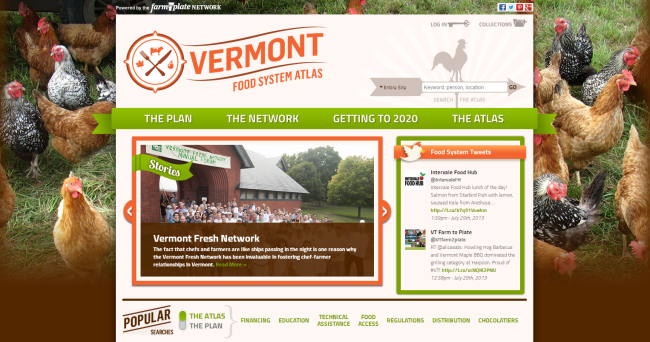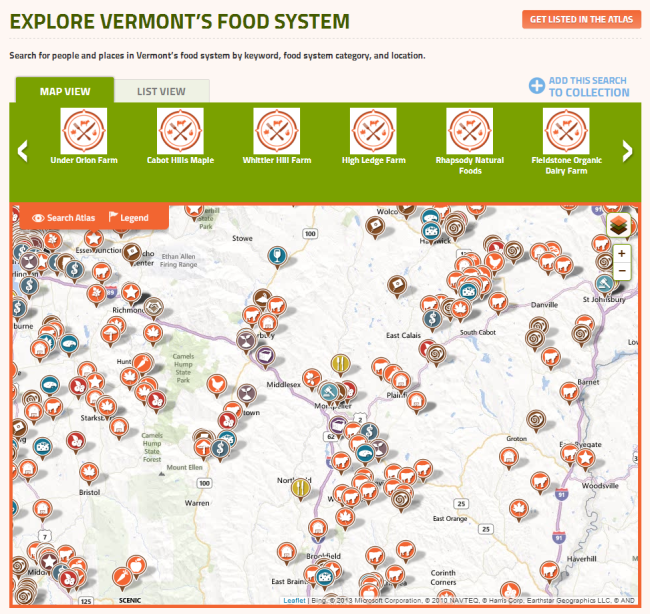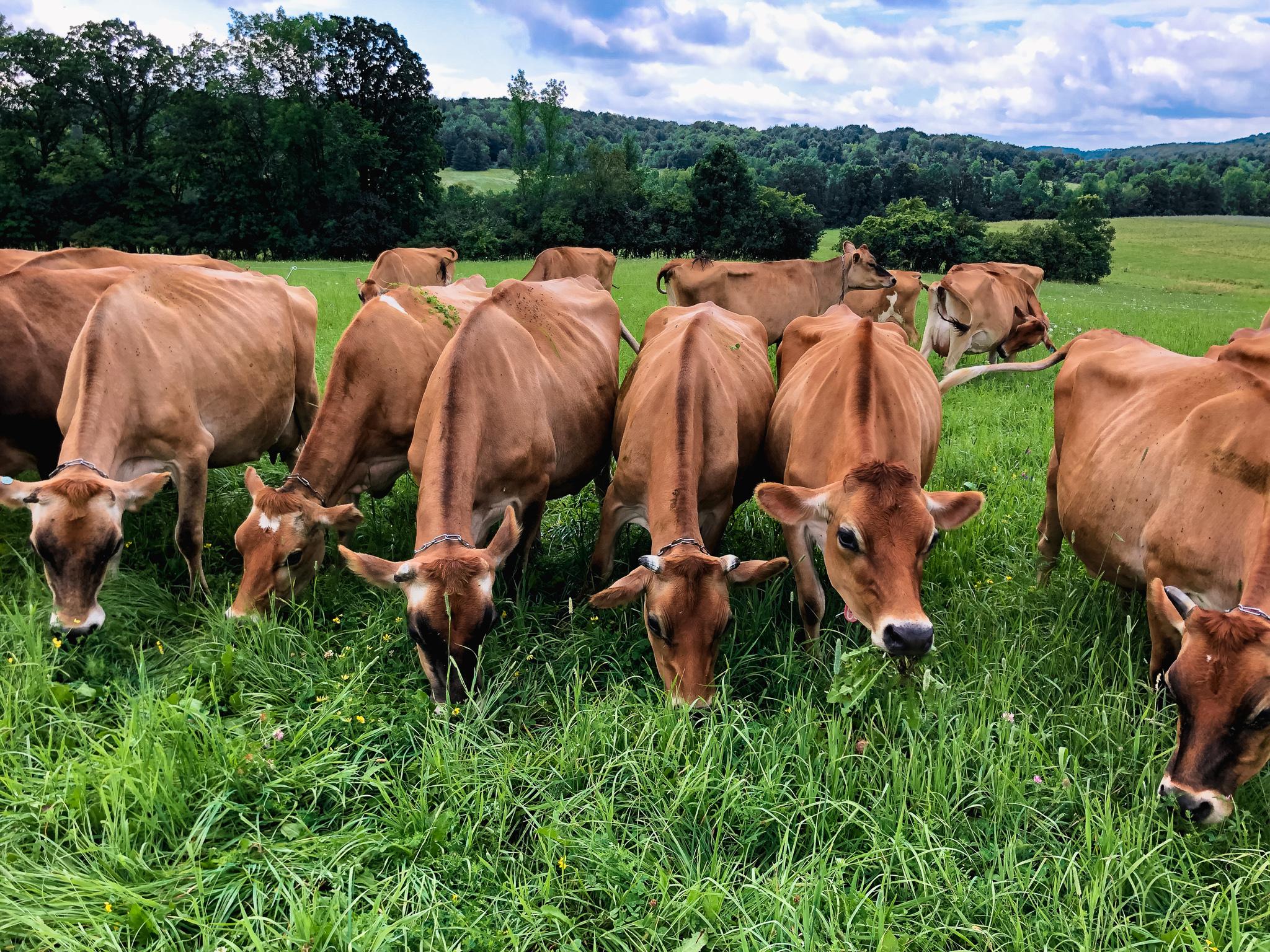The Vermont Farm to Plate Network is weaving together all components of Vermont's food system to strengthen the working landscape, build the resilience of farms, improve environmental quality, and increase local food access for all Vermonters. It’s made up of over 250 organizations (including NOFA-VT!) encompassing farm and food system businesses, educational institutions, nonprofit organizations, and government agencies working together to implement the state’s Farm to Plate Strategic Plan—possibly the most comprehensive food system plan in the country and the first in New England.
Coordinated by the Vermont Sustainable Jobs Fund, both the Farm to Plate Network and Strategic Plan can be accessed in full detail at the Vermont Food System Atlas—a new, online collective food system inventory.
 The Vermont Food System Atlas features thousands of agricultural resources to help connect Vermont farmers to food processing businesses, specialty food producers, educational institutions, nonprofit organizations, consumers, and state government. Farmers and agricultural producers can use the Atlas to build economic partnerships based on production, distribution, marketing, and outreach goals. The Atlas also features thousands of food system resources including stories, videos, job listings, data, and a map searchable by people and places, region, keyword, and food system categories.
John Cleary of Cleary Family Farm in Plainfield recently created a profile in the Atlas.
The Vermont Food System Atlas features thousands of agricultural resources to help connect Vermont farmers to food processing businesses, specialty food producers, educational institutions, nonprofit organizations, consumers, and state government. Farmers and agricultural producers can use the Atlas to build economic partnerships based on production, distribution, marketing, and outreach goals. The Atlas also features thousands of food system resources including stories, videos, job listings, data, and a map searchable by people and places, region, keyword, and food system categories.
John Cleary of Cleary Family Farm in Plainfield recently created a profile in the Atlas.
 As a growing interactive directory with more than 5,000 individual food system profiles and web traffic increasing daily, the Atlas provides free marketing exposure for Vermont farm and food businesses and organizations. Any user can locate services and support not easily found on the internet – from compost suppliers to funding opportunities.
Anyone who creates a profile on the Atlas can post events, jobs, and news for free, anytime. The Atlas offers farmers the opportunity to connect with folks from all over the state to help build relationships and develop business partnerships. With farmers at the heart of Vermont’s food system, news from around the state helps showcase the great work taking place to strengthen Vermont’s food system.
The Vermont Farm to Plate Network is not only working to grow Vermont’s food system but is also helping build a vibrant food system for the Northeast. Network members are active participants in the Northeast Sustainable Agriculture Working Group and the Food Solutions New England Network. Vermont is also playing an important role in helping other states develop food system plans. The Food System Atlas helps bridge Vermont’s multi-faceted local food efforts and programs to a statewide level to prepare Vermont for its vital role in creating a robust regional food system.
Visit the Atlas at www.vtfoodatlas.com and tweet with us at @VTFarm2Plate, or follow the Vermont Sustainable Jobs fund on Facebook.
Rachel Carter is the communications director at the Vermont Sustainable Jobs Fund, a non-profit organization created by the Vermont Legislature in 1995 to accelerate the development of Vermont’s green economy.
As a growing interactive directory with more than 5,000 individual food system profiles and web traffic increasing daily, the Atlas provides free marketing exposure for Vermont farm and food businesses and organizations. Any user can locate services and support not easily found on the internet – from compost suppliers to funding opportunities.
Anyone who creates a profile on the Atlas can post events, jobs, and news for free, anytime. The Atlas offers farmers the opportunity to connect with folks from all over the state to help build relationships and develop business partnerships. With farmers at the heart of Vermont’s food system, news from around the state helps showcase the great work taking place to strengthen Vermont’s food system.
The Vermont Farm to Plate Network is not only working to grow Vermont’s food system but is also helping build a vibrant food system for the Northeast. Network members are active participants in the Northeast Sustainable Agriculture Working Group and the Food Solutions New England Network. Vermont is also playing an important role in helping other states develop food system plans. The Food System Atlas helps bridge Vermont’s multi-faceted local food efforts and programs to a statewide level to prepare Vermont for its vital role in creating a robust regional food system.
Visit the Atlas at www.vtfoodatlas.com and tweet with us at @VTFarm2Plate, or follow the Vermont Sustainable Jobs fund on Facebook.
Rachel Carter is the communications director at the Vermont Sustainable Jobs Fund, a non-profit organization created by the Vermont Legislature in 1995 to accelerate the development of Vermont’s green economy.
 The Vermont Food System Atlas features thousands of agricultural resources to help connect Vermont farmers to food processing businesses, specialty food producers, educational institutions, nonprofit organizations, consumers, and state government. Farmers and agricultural producers can use the Atlas to build economic partnerships based on production, distribution, marketing, and outreach goals. The Atlas also features thousands of food system resources including stories, videos, job listings, data, and a map searchable by people and places, region, keyword, and food system categories.
John Cleary of Cleary Family Farm in Plainfield recently created a profile in the Atlas.
The Vermont Food System Atlas features thousands of agricultural resources to help connect Vermont farmers to food processing businesses, specialty food producers, educational institutions, nonprofit organizations, consumers, and state government. Farmers and agricultural producers can use the Atlas to build economic partnerships based on production, distribution, marketing, and outreach goals. The Atlas also features thousands of food system resources including stories, videos, job listings, data, and a map searchable by people and places, region, keyword, and food system categories.
John Cleary of Cleary Family Farm in Plainfield recently created a profile in the Atlas.
“As a diversified farmer, I anticipate being able to use the Food System Atlas as a single source to connect with all the resources available to help me farm successfully. Improving farmer access to technical assistance programs, educational workshops, and financing opportunities will help Vermont farmers grow and develop new markets. In my role as a fieldman for Organic Valley, the Atlas will help me connect new and existing farmers with market opportunities offered by our farmer-owned cooperative,” shares John.All Vermont farmers and food producers as well as other businesses and organizations connected to the state’s food system are invited to create a FREE profile on the Atlas.
 As a growing interactive directory with more than 5,000 individual food system profiles and web traffic increasing daily, the Atlas provides free marketing exposure for Vermont farm and food businesses and organizations. Any user can locate services and support not easily found on the internet – from compost suppliers to funding opportunities.
Anyone who creates a profile on the Atlas can post events, jobs, and news for free, anytime. The Atlas offers farmers the opportunity to connect with folks from all over the state to help build relationships and develop business partnerships. With farmers at the heart of Vermont’s food system, news from around the state helps showcase the great work taking place to strengthen Vermont’s food system.
The Vermont Farm to Plate Network is not only working to grow Vermont’s food system but is also helping build a vibrant food system for the Northeast. Network members are active participants in the Northeast Sustainable Agriculture Working Group and the Food Solutions New England Network. Vermont is also playing an important role in helping other states develop food system plans. The Food System Atlas helps bridge Vermont’s multi-faceted local food efforts and programs to a statewide level to prepare Vermont for its vital role in creating a robust regional food system.
Visit the Atlas at www.vtfoodatlas.com and tweet with us at @VTFarm2Plate, or follow the Vermont Sustainable Jobs fund on Facebook.
Rachel Carter is the communications director at the Vermont Sustainable Jobs Fund, a non-profit organization created by the Vermont Legislature in 1995 to accelerate the development of Vermont’s green economy.
As a growing interactive directory with more than 5,000 individual food system profiles and web traffic increasing daily, the Atlas provides free marketing exposure for Vermont farm and food businesses and organizations. Any user can locate services and support not easily found on the internet – from compost suppliers to funding opportunities.
Anyone who creates a profile on the Atlas can post events, jobs, and news for free, anytime. The Atlas offers farmers the opportunity to connect with folks from all over the state to help build relationships and develop business partnerships. With farmers at the heart of Vermont’s food system, news from around the state helps showcase the great work taking place to strengthen Vermont’s food system.
The Vermont Farm to Plate Network is not only working to grow Vermont’s food system but is also helping build a vibrant food system for the Northeast. Network members are active participants in the Northeast Sustainable Agriculture Working Group and the Food Solutions New England Network. Vermont is also playing an important role in helping other states develop food system plans. The Food System Atlas helps bridge Vermont’s multi-faceted local food efforts and programs to a statewide level to prepare Vermont for its vital role in creating a robust regional food system.
Visit the Atlas at www.vtfoodatlas.com and tweet with us at @VTFarm2Plate, or follow the Vermont Sustainable Jobs fund on Facebook.
Rachel Carter is the communications director at the Vermont Sustainable Jobs Fund, a non-profit organization created by the Vermont Legislature in 1995 to accelerate the development of Vermont’s green economy. 
